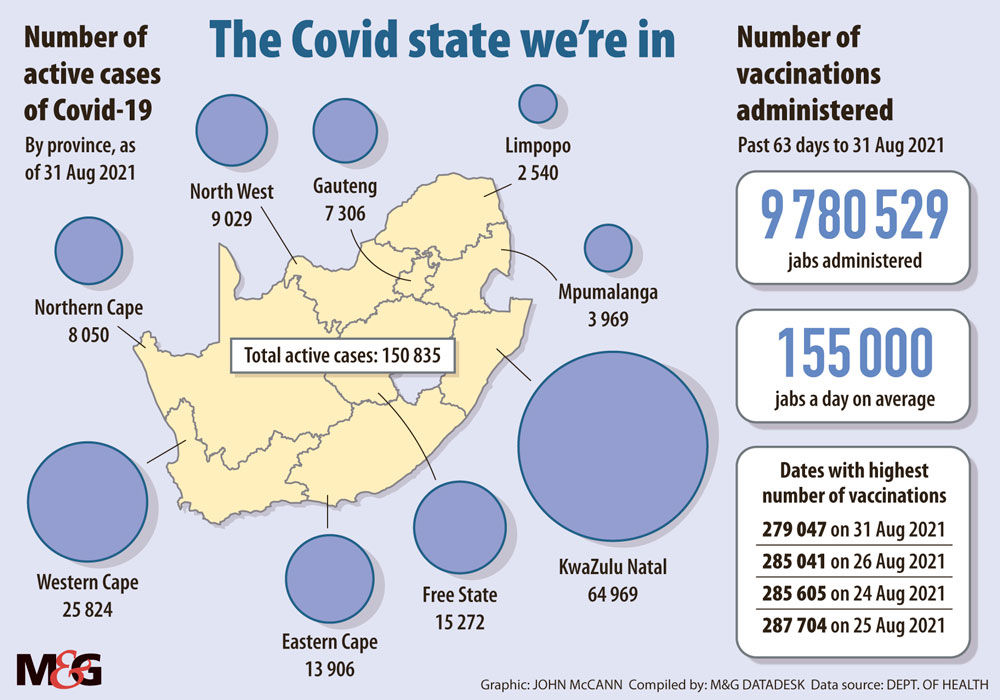Since mid-July, the number of vaccines administered has consistently hit more than 200 000 jabs a day. By 31 August more than 12-million jabs had been administered. (Photo by LUCA SOLA / AFP)
In about a month South Africa will reach the three million Covid-19 positive-cases mark. Just this past week there have been close to 70 000 positive cases reported. Several provinces have shown a high new-case-incidence rate, which is the number of positive cases per 100 000 people.
Leading the charts, and of concern, is the Northern Cape, which had about 8 000 active cases on 31 August; the incidence rate in the province was 40.5 people per 100 000. The Free State followed with 25 and then the Eastern Cape, with an incidence rate of 23.5.
Professor Shabir Madhi, the director of the Vaccines and Infectious Diseases Unit at the University of the Witwatersrand, said although some provinces, such as Gauteng, have passed the peak of the third wave, others are still to do so, and this should keep everyone vigilant. He added that some provinces, including KwaZulu-Natal, were still on an upwards trajectory, with a high positivity rate.
“We need to be concerned about the fourth wave. We can’t avoid that. But there will be a big difference between the two surges. The impact will largely depend on the percentage of people above the age of 35 who have been vaccinated,” he said.
Madhi told the Mail & Guardian that, over the course of the three waves, about 70% of the population has been infected with the virus. “A large part of the population has developed what I term a ‘natural immunity’. But that doesn’t mean people shouldn’t get vaccinated.”
Since mid-July, the number of vaccines administered has consistently hit more than 200 000 jabs a day. By 31 August more than 12-million jabs had been administered.
However, C.1.2, the new variant discovered by genomic surveillance experts from the National Institute for Communicable Diseases (NICD) and the Kwa-Zulu Natal Research Innovation and Sequencing Platform (Krisp), could bring more uncertainty to the pandemic’s trajectory.
The NICD released a pre-print paper on the discovery of C.1.2, a new variant of Covid-19 this week. Although the findings are yet to be peer reviewed, the researchers said the new sequences of the virus were found to have mutated “substantially” and were unexpected.
 (John McCann/M&G)
(John McCann/M&G)
Variant C.1.2 was first detected in May in Gauteng and Mpumalanga and by 13 August it had appeared in six of South Africa’s nine provinces and seven other countries in Africa, Asia, Europe and Oceania.
Currently classified as a potential variant of interest, C.1.2 mutated from the Pango lineage C.1, which was detected in January this year and has been found to have been between 45 and 59 mutations away from the original Wuhan Hu-1 virus.
“Variant C.1.2 has got more mutations than many of the variants circulating globally, some of which we haven’t seen before,” said Dr Cathrine Scheepers from the NICD.
Krisp infectious diseases specialist Dr Richard Lessells said variant C.1.2 was being actively monitored, mainly because its concerning mix of mutations might help the virus to spread more easily and partially evade the immune response.
Despite these surprising and rapid mutations, C.1.2 has currently not been classified as a variant of concern like the Alpha, Beta, Gamma and Delta variants, which were responsible for various waves of Covid-19 infections, with Delta shown to be highly transmissible and dominant globally.
“Work needs to be done to fully understand [the behaviour of the variant], but what we have seen so far, and what we would expect with this variant, is that the [current] vaccines retain high levels of protection against severe disease, hospitalisation and death,” Lessells said, adding that administering vaccines was crucial, as were non-pharmaceutical interventions.
Scheepers said there was no need for the public to panic about the C.1.2 variant.
“Right now, there isn’t any evidence to suggest that it would be any different from other variants that are currently circulating in South Africa. We do know that non-pharmaceutical interventions such as the wearing of masks, sanitising and washing your hands, and keeping a safe distance from people work against this virus, irrespective of the variant.”